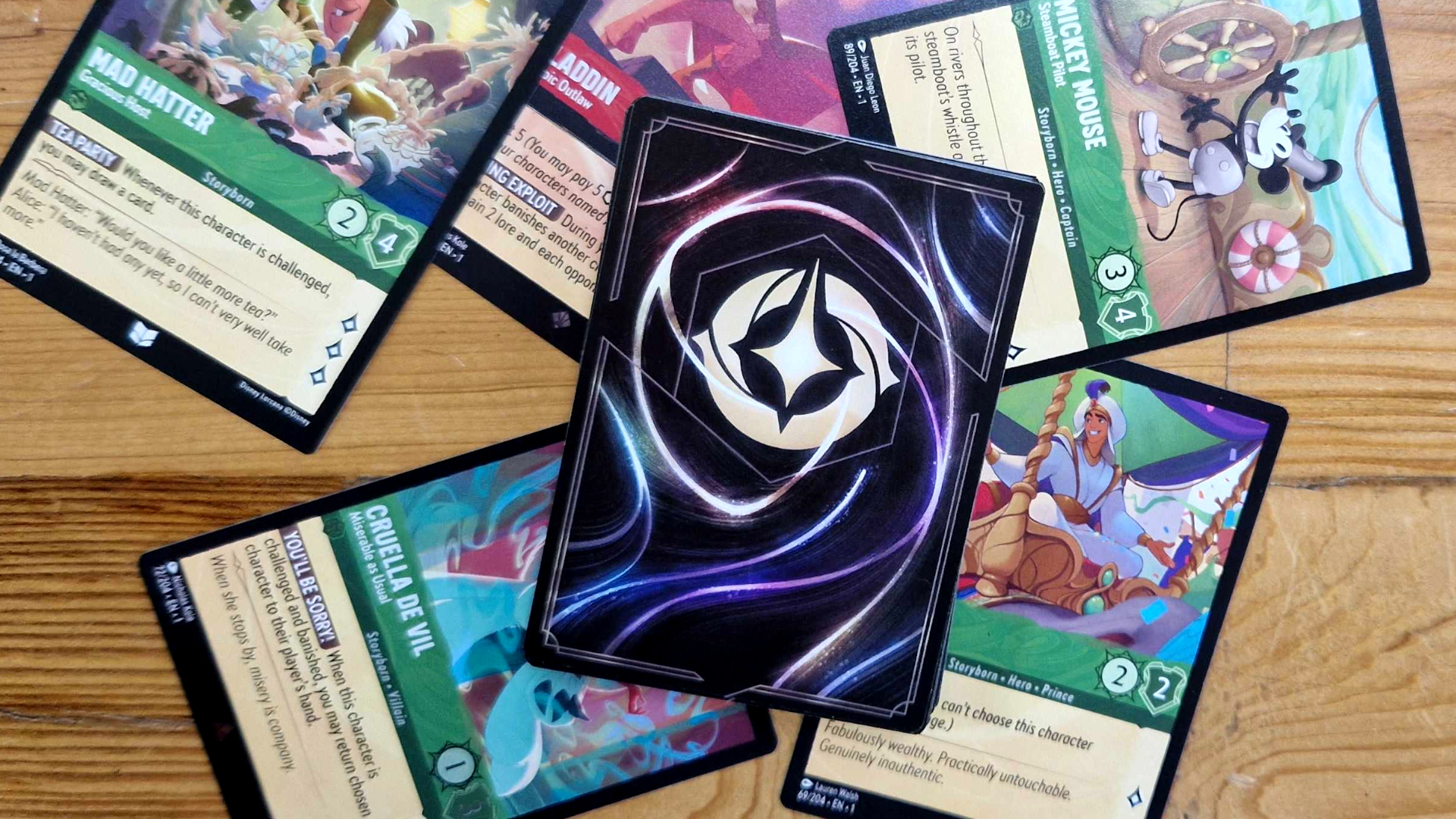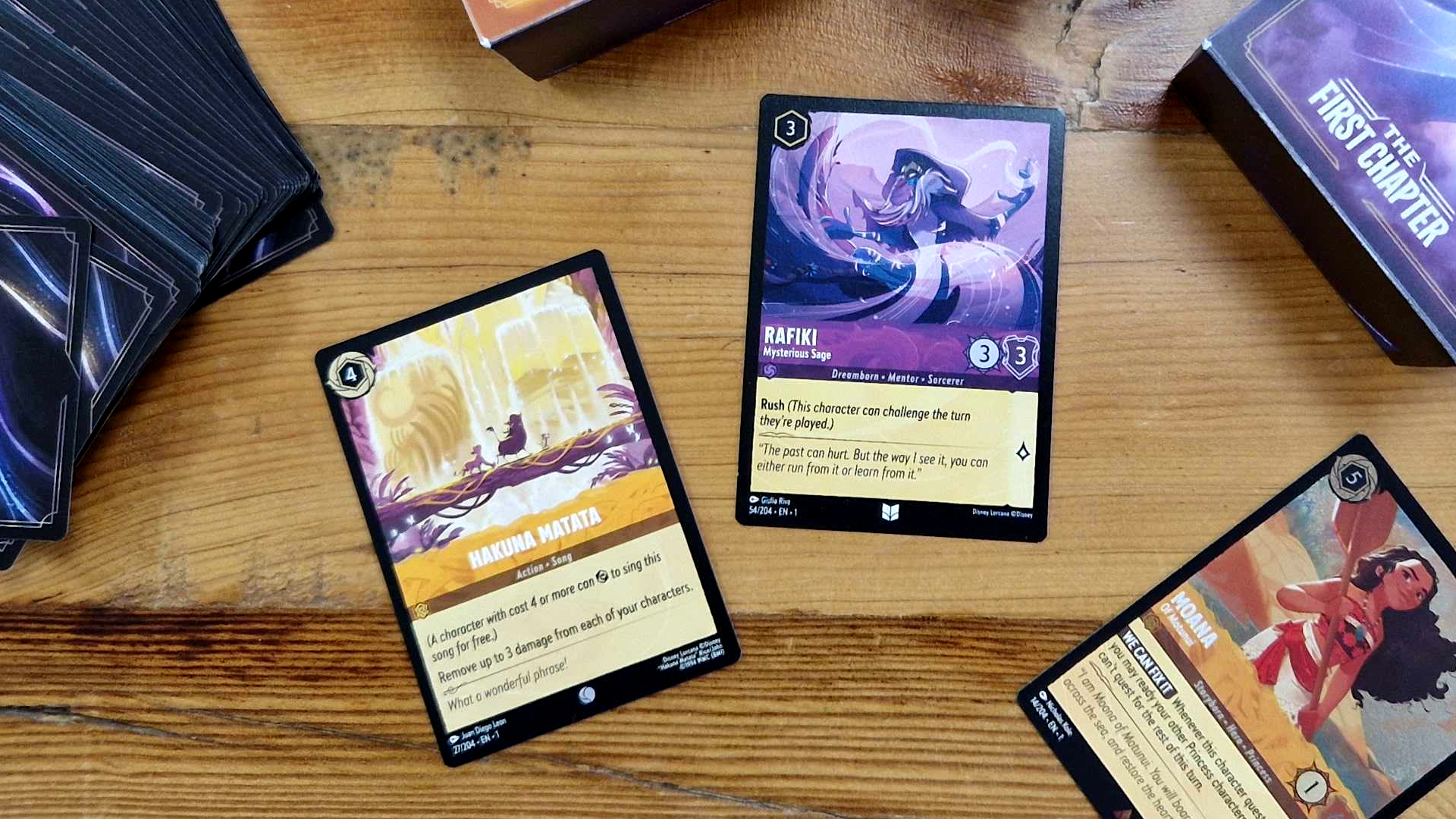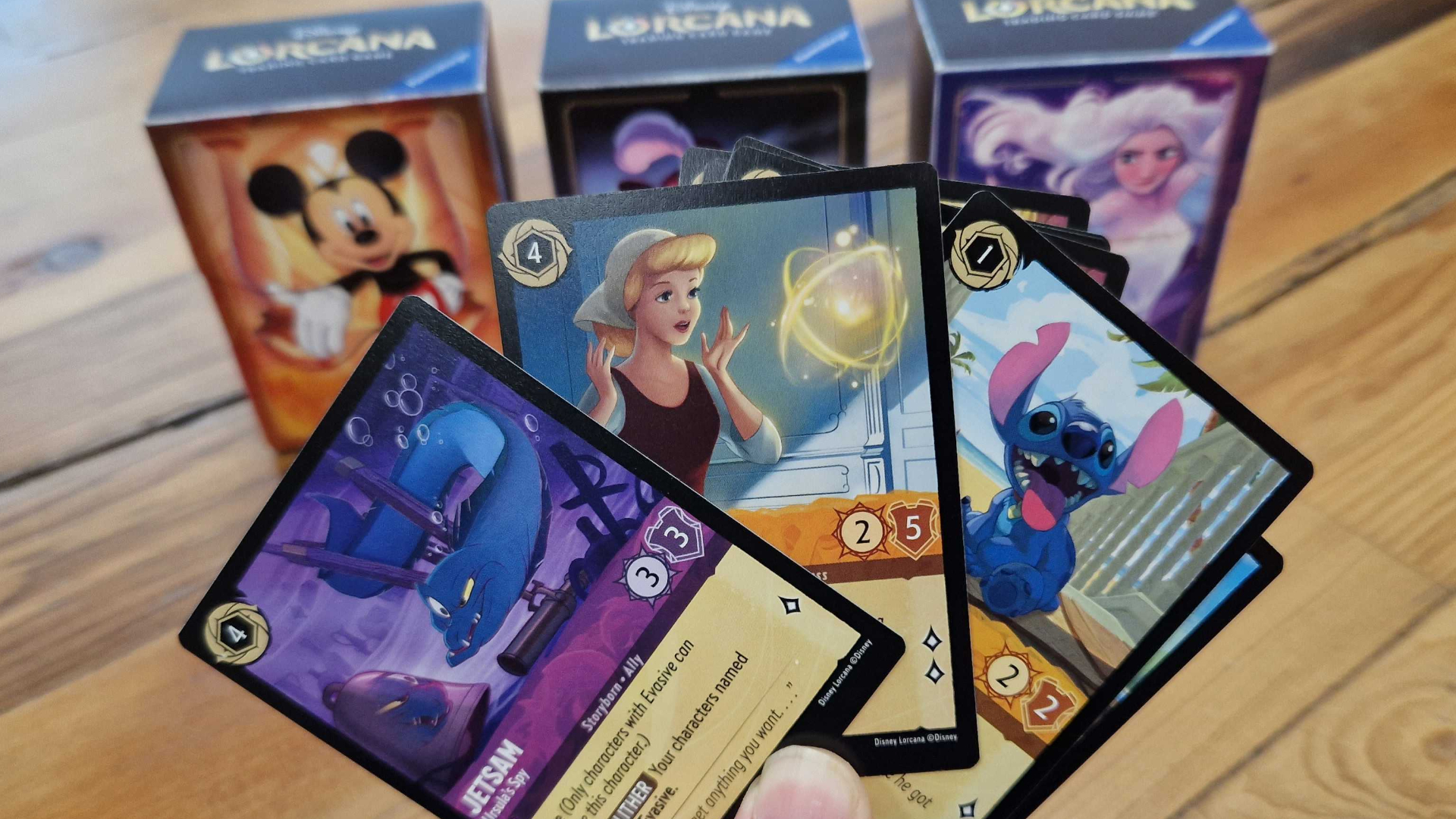Why Disney Lorcana is the trading card game we need right now
Being beginner-friendly may be the best thing about this game… and something its rivals can't match

Disney Lorcana has an interesting take on breaking the mold. Namely, it doesn't intend to.
Ignore the way it's dominated conversation for a moment. Put aside the game's runaway success. Despite its big ambitions, Disney Lorcana was never supposed to reinvent the wheel. As co-designer Ryan Miller told us at Gen Con 2023, "different was not a goal… Now, obviously, we want to feel fresh and fun and all these things. But really, our goal was to be welcoming."
What we're left with is a very different kind of trading card game - and it's exactly what the industry needs right now.
Beginner-friendly

Starting out fresh in such a competitive market must be unnerving. The likes of Magic and Pokemon (arguably two of the best card games ever made) have had that corner sewn up for decades, so finding space between them is, to put it generously, difficult. That's why the team behind Disney Lorcana pulled a trick from Nintendo's playbook instead. Rather than focusing exclusively on hardcore players for a slice of that rapidly shrinking pie, they'd go in the opposite direction. It'd be the 'approachable' trading card game, one that was still tactical but didn't scare newcomers away with reams of special terms you need a glossary to understand.
"We were kind of shooting for a smaller target," Miller says. "We were designing for an array of trading card gamers, and Disney fans, and clearly there's overlap. But there's also parts of that Venn diagram where it's just one or the other… We wanted a game where trading card gamers would find that kind of strategic depth, and the combos, and the synergies. But also a game that someone who's never played a game like this before can pick it up, understand the concepts, and then get drawn in by the characters."
I'm just excited to bring more people into gaming. I think that my sincere hope is that we get some Disney fans that have never gone into a hobby store before, and they'll walk in and go, 'where's this been all my life?'
Ryan Miller, Disney Lorcana co-designer
Considering how difficult it can be to get your head around Magic or Pokemon these days (there's a reason Magic's head designer noted in an old blog that the company has spent "almost 30 years trying to make a product where people can teach themselves, and it’s turned out to be really, really hard"), that accessibility is overdue. There's nothing wrong with complexity, of course, but Lorcana's popularity suggests a clear desire for the opposite too.
As noted in our Disney Lorcana first impressions piece, the game's disinterest in slavishly mimicking everyone else gives it a chance of going the distance long-term. It actually reminds me of how Magic used to be; almost everything you need to know is found on the cards themselves, and its core rules are surprisingly straightforward. It's not tangled up in terms or effects that are presented without context, requiring wiki research to find out what they mean.
Sign up to the GamesRadar+ Newsletter
Weekly digests, tales from the communities you love, and more
House of cards

Not that trading card game veterans will find it dull, of course. The mantra of 'easy to learn, hard to master' has always driven Lorcana.
"The main job of a rule system, in my opinion, other than fun and that sort of thing, is to be a strong frame, like a house frame, so that it can hold a nice roof and floors and furniture," Miller explains. "Those things are the cards. The frame itself can have that kind of simplicity. It can have that welcoming newness. And then the strategy and complexity actually comes on which cards you choose, how you employ your cards. There's a couple of examples of this in the game design, and the main one is the Ink system. So using a card from your hand as a resource is clearly not a new mechanic. But I do believe what we did with it is fairly new, which is the idea that only some cards can be used as Ink… It adds a level of variance that's important to trading card games.
"Just the choice of which card to Ink is actually fairly skill-testing if you want it to be, because really what you're doing when you're looking at your hand, you look at the table, and you look over at what your opponent's doing, is you're saying 'which of these cards is least useful to me in this situation?'"

Does Miller have any advice on what deck you should get to begin with?
"I think the newer players would probably gravitate towards the Amber & Amethyst deck. That's a deck about getting just a bunch of characters out and just Questing [gaining points] really fast… Emerald & Ruby is really, I think, the most strategically complex of the three. I wouldn't call it a complex deck. But on a scale of one to three, it's probably the highest as far as strategy is concerned."
We've got some thoughts on the subject too, and you can check out the best set for you in our Disney Lorcana Starter Decks guide.
As with Magic, an ongoing plot takes center-stage to keep dedicated players invested as well (it was apparently the first major work done on Lorcana, with Miller pointing out that the team "wanted to make sure that it didn't feel like we were just putting characters on cards"). Indeed, the story and mechanics being so tightly bound together helps the game feel much more considered, and less cynical than it otherwise would have been. For instance, multiple versions of the same character in your deck are explained away by them being 'Glimmers.' These are stories made real by an Illumineer, you, who can bring fairytales to life from the pages of a book (hence the term 'Ink').
Gramma Tala from Moana is another case in point.
"I'm a sucker for a good theme," says Miller. "Gramma Tala has an ability called 'I Will be with You,' and when she is banished from play, instead of going to the discard pile, she becomes Ink, because she will always be with you. I just love when story and mechanics can come together so elegantly."
That attention to detail is another crucial part of Lorcana's appeal. Open a box and it'll quickly become obvious that a lot of care has gone into the game's construction - something shared by publisher Ravensburger's Disney Villainous series. As Miller notes, it's "really important, that component of love. Which sounds pretty corny, I guess. But that's how I feel, right? I believe that. I believe that people feel the love when they pull the box off the shelf or when they thumb through the cards. These characters and stories are so important and so loved, and we want to make sure [players] understand that."
What's interesting to me about Questing in this game is it's actually a very aggressive move. It seems kind of passive, but it's pretty aggressive because what you're saying your opponent is, 'better do something. You can let me Quest if you want, but you better do something.' It really puts the ball in their court.
Ryan Miller, Disney Lorcana co-designer
It certainly seems to be working. Ravensburger has had to promise that more units are coming on social media because the game is selling so well, and it seems to be reaching beyond the usual trading card game crowd.
"Just just before this round of interviews, I was downstairs in the demo room," Miller tells us. "And there was a mom, dad, and three daughters. They'd all just finished their demo. And the girls picked out the decks and they were very excited, like 'I want that deck,' and dad was kind of lagging behind. And the mom's like, 'well, which one does dad [get]?' and… they're like, 'we already picked one for you,' and it was heartwarming. Because I could totally see this family sitting down and playing this game with each other. And that gives me goosebumps every time I bring it up, because the idea of bringing families together, or friends together to sit down and make memories, that's why I'm in this business. That's why I do this."
We'll have to wait and see if Lorcana can maintain that momentum, but considering how difficult it's proving to be to find cards, its chances are good. If its launch is anything to go by, this game is here to stay - and hopefully its rivals can take a leaf from its book.
To find out when the next wave of cards is coming, check in with our Disney Lorcana release date explainer. As for something else to keep you busy at the tabletop, don't miss the best board games.

I've been writing about games in one form or another since 2012, and now manage GamesRadar+'s tabletop gaming and toy coverage. You'll find my grubby paws on everything from board game reviews to the latest Lego news.


